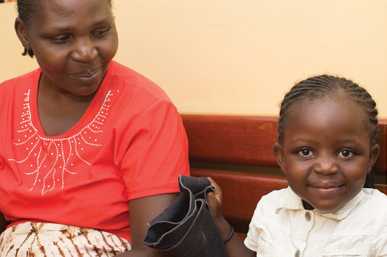Preventing Mother-to-Child HIV Transmission

What We Do
This week alone, 2,800 children were infected with HIV and 2,100 children died of AIDS-related causes. CDC’s Division of Global HIV & TB (DGHT) works to save more lives through the elimination of mother-to-child transmission. CDC helps identify children and adolescents living with HIV to get them the appropriate services and treatment they need. CDC staff provide programmatic and scientific expertise globally, with a focus in Sub-Saharan Africa, to expand, improve, and evaluate prevention of mother-to-child HIV transmission (PMTCT) and pediatric HIV services. We help countries to develop and implement effective programming that maximizes the impact of every dollar invested, and achieve sustainable control of the HIV epidemic.
Why We Do It
By significantly increasing the number of mothers and children on life-saving antiretroviral treatment (ART), we can dramatically reduce transmission of HIV worldwide and help those living with HIV live longer, healthier lives. Although pregnant women living with HIV are starting treatment at unprecedented rates, we know there is a gap among adolescent girls, who are disproportionately affected by HIV. We are continuing to identify ways to reach them by offering specialized services unique to teens.
Results
CDC has been a forerunner in providing life-long ART to pregnant and breastfeeding women. As an implementing agency of the U.S. President’s Plan for Emergency AIDS Relief (PEPFAR), CDC provides care and treatment services to pregnant women and children and has increased the clinical capacity of local health systems around the world.
In 2016, in partnership with local governments, Ministries of Health, community groups and other partners, CDC programs helped to:
- Initiate ART for more than 90 percent of pregnant women identified as HIV positive at CDC-supported PMTCT facilities
- Deliver treatment for 411,000 HIV-positive, pregnant women during pregnancy and childbirth to reduce the risk of mother-to-child transmission
Since 2014, CDC has been participating in the PEPFAR Accelerating Children’s HIV/AIDS Treatment (ACT) Initiative. ACT is a public-private partnership with the Children’s Investment Fund Foundation that has enabled 557,000 children to receive HIV treatment in nine countries in sub-Saharan Africa.
For more information on mother-to-child transmission, see below:

Successes in Malawi paving the way for an AIDS-free generation
Achieving an AIDS-free generation has long seemed like a distant goal, but that could soon change. In Malawi, which has one of the highest rates of HIV in the world, women often have to travel long distances and wait to see if their CD4 count, which indicates the progression of their infection, is low enough to warrant treatment for their own health.
Read more: HTML »
- Page last reviewed: September 28, 2016
- Page last updated: September 28, 2016
- Content source:


 ShareCompartir
ShareCompartir